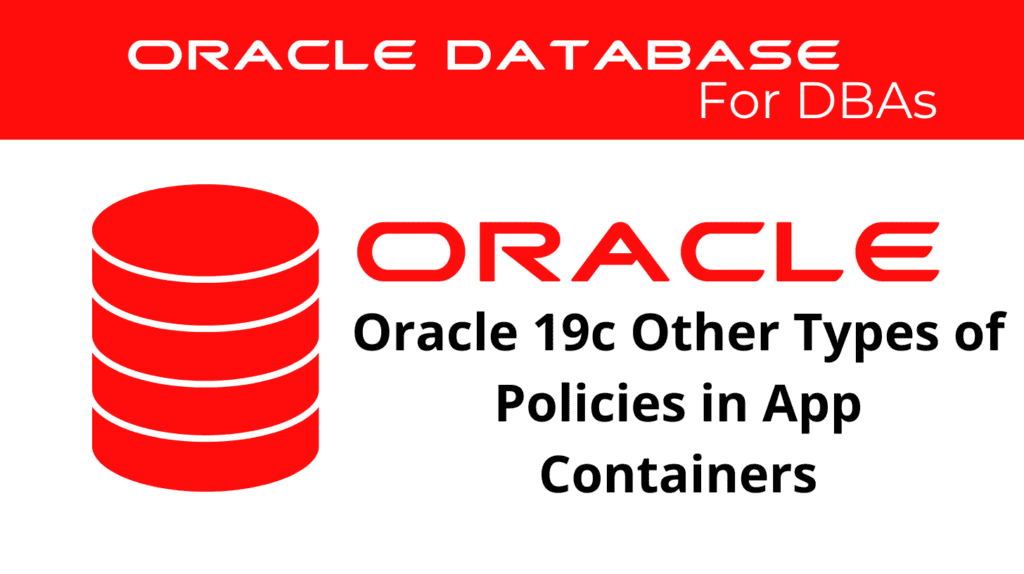
Managing policies in Oracle 19c is essential for ensuring the security and efficiency of your application containers. This article will explore various aspects of policy administration, focusing on policy management, application policies, and the intricacies of managing policies within Oracle 19c application containers. We’ll provide a comprehensive guide on how to implement these policies effectively.
Understanding Policy Administration
Policy administration in Oracle 19c involves creating, managing, and enforcing various policies within your application containers. These policies can range from security policies to operational guidelines that ensure your databases and applications function as intended. The goal is to maintain a controlled environment where user activities and system operations adhere to predefined rules.
Types of Policies in Oracle 19c
Security Policies: These policies are designed to protect your data and ensure only authorized users can access specific resources.
Operational Policies: These focus on the efficient management of database operations, including backup procedures, resource allocation, and performance tuning.
Compliance Policies: Ensuring that your database operations comply with internal and external regulations.
Creating Policies
Creating policies in Oracle 19c involves using SQL statements to define the rules and conditions that apply to different operations. For example:
Example SQL Statement
CREATE POLICY my_security_policy ON my_table FOR SELECT USING (user = 'authorized_user');
This SQL statement creates a security policy that restricts SELECT operations on my_table to only those performed by authorized_user.
📢 You might also like: Oracle 19c Using External Tables (Category: Oracle Database Admin)
Implementing Policy Management in Application Containers
Effective policy management within application containers requires a clear understanding of your environment and the specific needs of your applications. Here are the key steps to implement policy management:
Assess Your Requirements
Before creating any policies, assess the specific requirements of your application containers. Identify the critical operations and data that need protection, and determine the appropriate policies to enforce.
Define Policies
Using the information gathered, define the necessary policies. For instance, you might create a policy to enforce user authentication for accessing sensitive data:
Example SQL Statement
CREATE POLICY sensitive_data_policy ON sensitive_table FOR SELECT, INSERT, UPDATE, DELETE USING (user IN ('admin', 'db_manager'));
Apply Policies to Application Containers
Policies need to be applied at the appropriate level within your application containers. In Oracle 19c, you can apply policies at the root container or individual pluggable databases (PDBs):
Example SQL Statement
ALTER PLUGGABLE DATABASE pdb1 APPLY POLICY sensitive_data_policy;
Monitor and Adjust Policies
Policy management is an ongoing process. Continuously monitor the effectiveness of your policies and adjust them as needed to respond to new threats or changes in your environment:
Example SQL Statement
ALTER POLICY sensitive_data_policy ADD CONDITION (time >= '09:00' AND time <= '17:00');
Best Practices for Managing Policies
Regular Reviews
Regularly review your policies to ensure they remain relevant and effective. Update policies to address any new security threats or changes in operational requirements.
User Training
Ensure that users understand the policies in place and their roles in maintaining compliance. Regular training sessions can help keep everyone informed and vigilant.
Automation
Where possible, automate policy enforcement to reduce the risk of human error. Use Oracle’s built-in tools and features to streamline policy management processes.
Conclusion
Managing policies in Oracle 19c application containers is crucial for maintaining a secure and efficient database environment. By following best practices and continuously monitoring and adjusting your policies, you can ensure that your applications run smoothly and securely. Effective policy administration, including the use of security, operational, and compliance policies, is essential for any robust Oracle 19c deployment.
Summary
In this article, we discussed the importance of policy administration in Oracle 19c, covering various types of policies, their implementation, and best practices for managing them within application containers. By following these guidelines, you can ensure that your application containers remain secure, efficient, and compliant with all necessary regulations.
See more on Oracle’s website!
Be Oracle Database Certified Professional, this world is full of opportunities for qualified DBAs!





